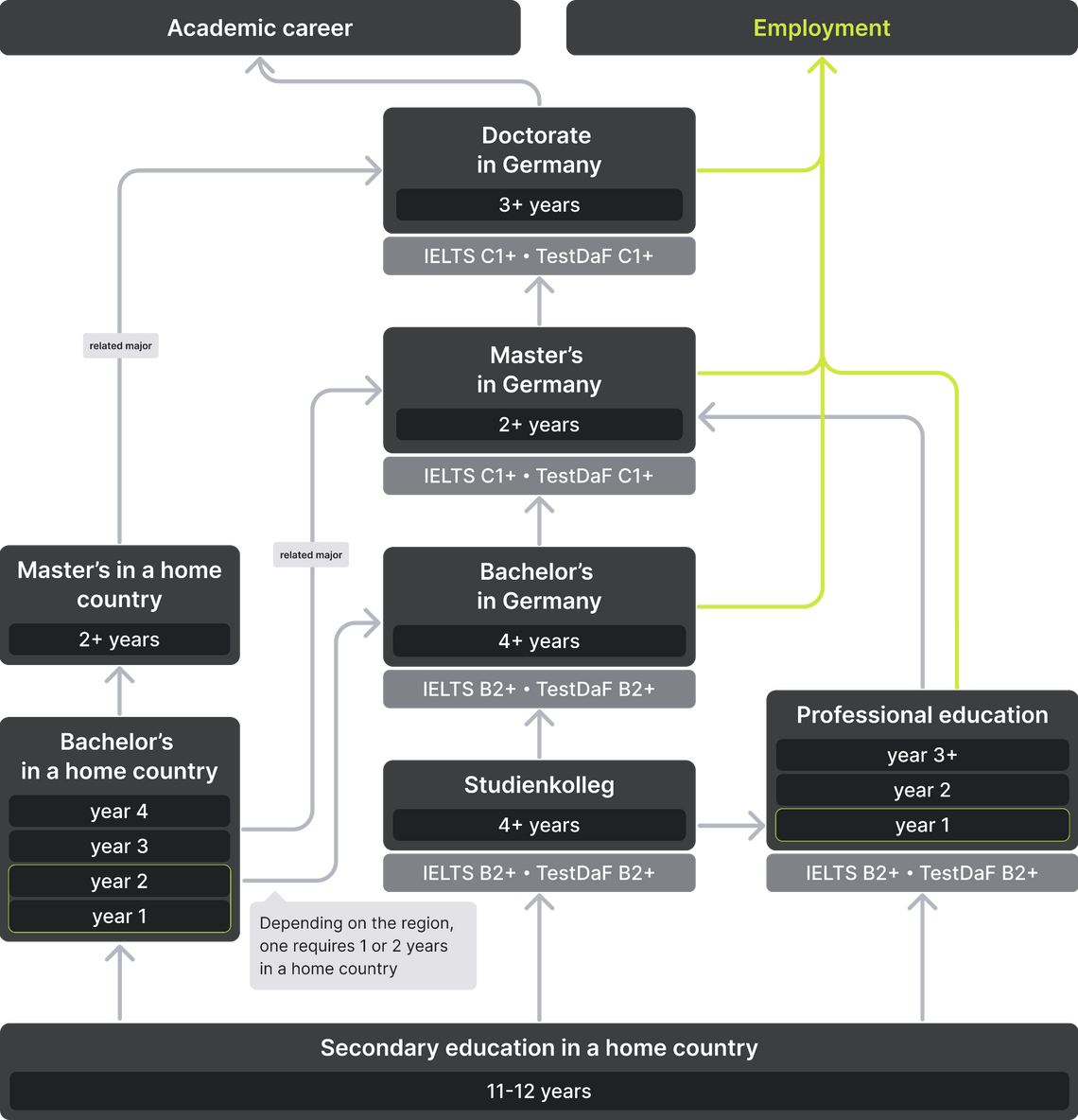
Secondary education in Germany
According to German law, education is compulsory for all children from the age of 6 to 15. After 5th grade, students go to high school. Here training is divided into two stages. Sekundarstufe I lasts from 5th to 9-10th grade and ends with a diploma of secondary education. Sekundarstufe II lasts from 11th to 13th grade. It prepares students for employment or admission to the university. There are several types of secondary educational institutions in Germany. Children can choose different types of schools based on their grades and teacher’s recommendations.
- Hauptschule handles vocational education. Any student can enter, regardless of the grades at the previous stage of training. The main goal is to provide average or low-performing students with an adequate education. Training here lasts 6 years. The curriculum isn’t different from other schools but is taught at a slower pace. After receiving a certificate of secondary education, students can find work or go to Berufsfachschule.
- Realschule is ranked between Hauptschule (lowest) and Gymnasium (highest). After graduating from such school students with high academic performance can enter a gymnasium, and the rest can get a job or enroll in Berufsfachschule. Training also takes 6 years. In Berlin and Hamburg, the Realschulen were merged with the Hauptschulen and the old Gesamtschulen to create a new type of joint school — Stadtteilschule and Sekundarschule.
- Gymnasium accepts only high performing students. Here training lasts 9 years. A distinctive feature of the gymnasium is two foreign languages in the curriculum. Graduates receive the title of Abitur and get the opportunity to go to any university or college of their choice.
- Integrierte Gesamtschule was created as a result of the growing criticism of the existing education system. Here, regardless of grades, all children study together under the same curriculum. Students can choose from three levels of difficulty for specific subjects (A, B and C).
Education in Germany continues to be one of the most popular destinations for student immigration, second only to the UK and France[1]. Higher education in German state universities is free (except for the state of Baden-Württemberg). But hundreds of programs are also available in English and their quality is improving with each passing year. More than 20 German universities rank in the top 500 universities in the world[2]. The economic success of the country depends on high-level specialists, thus, Germany pays close attention to the education sector. Over the past 100 years, Germany has been the heart of the innovation of the university system. Students who come here find themselves in the very heart of modern scientific and intellectual activity.
Advantages of studying in Germany
- Prestige and quality of education. According to QS, more than 20 German educational institutions are among the top 500 universities in the world[2]. THE (Times Higher Education) includes 40 German institutions on its list[3], and Shanghai's ARWU (Academic Ranking of World Universities) rating — 30[4].
- Cost of education. Education in state universities in the German language is free in most federal states. Only Baden-Württemberg introduced an extra fee of 1,610 USD per semester for non-EU international students.
- International Center. Germany is home to 32 of the 500 largest international companies[5]. Many of them are leaders in their field: Volkswagen, BMW Group, Siemens, Bosch Group, Bayer, Adidas. Each company offers students unique internship opportunities.
- Jobseeker visa. Graduates of German universities have an opportunity to stay in Germany for an additional 1,5 years in order to look for work.
Disadvantages and features of studying in Germany
- The autonomy of federal states. Germany is a federation consisting of 16 states (Länder) with full sovereignty in matters of public administration. Therefore, the entry requirements, the cost of training and the structure of educational programs can vary depending on the region to which a university belongs.
- Losing a year. If secondary education in a student's home country lasts less than 12 years, it is more than likely that they will have to study an additional year in Studienkolleg before applying to bachelor programs in Germany.
- High prices for accommodation. Germany ranks 30th in the list of countries with the most expensive residences in the world[6]. Renting a one-room apartment here costs 698 USD, and household expenses can be up to 859 USD per month[7].
- Limited employment for non-EU citizens. Before the adoption of the Law on Qualified Immigration in March 2020, college graduates can only choose professions with a shortage of labor. There is also a “priority check” system, which obliges the Federal Employment Agency (Bundesagentur für Arbeit) to issue a work permit only if an employee from Germany or an EU member state has not applied for this position.
Cost and structure of education in Germany
| Program | Min. age | Duration | Min. cost | Avg. cost | Min. language level | Exams |
|---|---|---|---|---|---|---|
| Summer Camp | 7+ | 1–12 weeks. | 977 USD/week | 1,126 USD/ week | A1 | - |
| Language Schools | 9+ | 1–12 weeks | 290 USD/week | 338 USD/week | A1 | - |
| Elementary school | 6 | 4 years | Free (State school) | 26,829 USD (Private) | B1 | - |
| High school | 10 | 5-9 years | Free (State school) | 26,829 USD (Private) | B1 | - |
| Studienkolleg (public) | 16+ | 1 year | Free | 322 USD | B2 | IELTS / TestDaF |
| Studienkolleg (private) | 16+ | 1 year | 3,220 USD | 10,732 USD | B2 | IELTS / TestDaF |
| College | 15+ | 1-2 years | 429 USD/year | 771 USD/year | B2 | IELTS / TestDaF |
| Bachelor’s (public) | 17+ | 3-4 years | Free | 3,220 USD/year | B2 | IELTS / TestDaF |
| Bachelor’s (private) | 17+ | 3-4 years | 6,439 USD/year | 12,878 USD/year | B2 | IELTS / TestDaF |
| MBA | 22+ | 1-2 years | 14,166 USD/year | 42,927 USD/year | C1 | IELTS / TestDaF |
| Master’s | 22+ | 2 years | Free | 9,272 USD/year | C1 | IELTS / TestDaF |
| Doctoral studies | 24+ | 3-4 years | Free | 7,512 USD/year | C1 | IELTS / TestDaF |
The majority of higher education establishments are universities and equivalent institutions (Universitäten und gleichgestellte Hochschulen):
- universities of applied sciences (Fachhochschulen),
- technical universities (Technische Universität),
- schools of fine arts and music (Kunst- und Musikhochschulen),
- medical (Medizinische Hochschulen),
- theological (Theologische Hochschulen),
- pedagogical (Pädagogische Hochschulen) universities.
Only Universitäten have the right to teach Doctoral programs. Colleges involved in vocational education are Berufsakademien and Fachschulen (Fachakademien).
In most federal states, education for international students in state institutions in German is free of charge. Some universities impose small administrative fees of 80 USD per semester or less (161 USD for Saxony).
In 5 Länder — Bremen, Lower Saxony, Saxony, Saxony-Anhalt, and Thuringia — students are required to pay 537 USD per semester if they exceed the time limit allocated for training.
In the 2017-2018 academic year, Baden-Württemberg introduced an additional fee of 1,610 USD per semester for students from countries outside the EU[8].
Tuition fees (per semester) for international students in the states of Germany
| State | Bachelor’s | Master’s | PhD | Admin. fee |
|---|---|---|---|---|
| Baden-Württemberg | 1,610 USD | 1,610 USD | 1,610 USD | 75 USD |
| Bavaria | 0 USD | 0 USD | 0 USD | 0 USD |
| Berlin | 0 USD | 0 USD | 0 USD | 54 USD |
| Brandenburg | 0 USD | 0 USD | 0 USD | 55 USD |
| Bremen | 0 USD | 0 USD | 0 USD | 54 USD |
| Hamburg | 0 USD | 0 USD | 0 USD | 54 USD |
| Hesse | 0 USD | 0 USD | 0 USD | 54 USD |
| Lower Saxony | 0 USD | 0 USD | 0 USD | 80 USD |
| Mecklenburg-Vorpommern | 0 USD | 0 USD | 0 USD | Up to 54 USD (set by uni) |
| North Rhine-Westphalia | 0 USD | 0 USD | 0 USD | 0 USD |
| Rhineland-Palatinate | 0 USD | 698 USD | Set by uni | 0 USD |
| Saarland | 0 USD | 0 USD | 0 USD | Up to 54 USD (set by uni) |
| Saxony | Set by uni | Set by uni | Set by uni | 27-161 USD |
| Saxony-Anhalt | 0 USD | Up to 537 USD (set by uni) | Set by uni | Set by uni |
| Schleswig-Holstein | 0 USD | 0 USD | 0 USD | 0 USD |
| Thuringia | 0 USD | 0 USD | 0 USD | Up to 54 USD (set by uni) |
Additional expenses
| Expenses | Average cost |
|---|---|
| Exams | 231 USD |
| Registration fee | 70 USD |
| Flight from Mumbai/Beijing/Los Angeles | 290 USD |
| Rent | 698 USD/month |
| Food | 644 USD/month |
| Health insurance | 86 USD/month |
| Study materials | 54 USD/month |
Options for admission to German universities

Foundation — Preparatory programs in Germany
There are special preparatory institutions for international students in Germany — Studienkollegs. If the education system in a student’s home country is not equal to German, studying in a Studienkolleg before applying to a university is mandatory. Check if your certificate or diploma is recognized in Germany here. See a list of all existing Studienkollegs here.
There are two types of such schools: Universitätskollegs prepare for admission to any higher educational institution, Fachhochschulkollegs — for admission to universities of applied sciences only. Universitätskollegs offer five specialized courses:
| Name | Specialty |
|---|---|
| M-Kurs | Medicine, biology, pharmacy |
| W-Kurs | Economics, social studies |
| T-Kurs | Math, science, technology |
| G-Kurs | Humanities, German studies |
| S-Kurs | Linguistics |
Fachhochschulkollegs offer four specialized courses:
| Name | Specialty |
|---|---|
| TI-Kurs | Technology, engineering |
| WW-Kurs | Economics |
| GD-Kurs | Design, arts |
| SW-Kurs | Social studies |
Studying at Studienkollegs lasts one academic year, divided into two semesters. Please note that courses are taught in German — this program doesn't imply language training. At the end of classes, students pass a final exam — Feststellungsprüfung.
Applicants are accepted in the Studienkollegs after the entrance test (Aufnahmetest), which assesses their level of the German language and basic knowledge in the chosen field.
Documents for admission to Studienkolleg
- Completed application;
- Copy of passport / ID;
- School leaving certificate with an officially certified translation in German or English;
- Updated CV;
- Language certificate.
Students submit documents online through the official portal of the German Center for International Education uni-assist. Usually, applications are accepted until July 12-15 if training starts from the winter semester (October) and until January 12-15 — if from the summer semester (March — April).
Please note that not all universities are connected to the uni-assist system (you can check it here). In this case, the scheme of admission might differ.
Students can also sign up for the final test without studying at Studienkolleg, but through self-study (externe Feststellungsprüfung). The following documents are required:
- Proof of inability to attend Studienkolleg;
- Proof of high academic performance at secondary school;
- Proof of language proficiency;
- Payment of administrative fee (161-215 USD).
Further, there are two options: either a student arrives in Germany or passes the exam remotely in a home country at one of the Goethe Institutes or DAAD centers. The exact dates and details of the test can be found on the website of a particular institution[9].

College — Professional education in Germany
There are two types of professional education institutions in Germany:
- Berufsakademien / Hochschulen dual offer practical-oriented programs consisting of theoretical and on-the-job training. The main difference from the university is that a student's work experience is a vital part of the educational process — programs are developed jointly with the employer. Training takes two years on average. The theoretical part lasts about three months, and the rest of the time is devoted to practice at the workplace. Besides possible scholarships, students receive a salary of 400 to 1,717 USD per month. After the final exam, graduates receive a diploma, or in some cases a bachelor's degree, if the university has the appropriate accreditation.
- Fachschulen / Fachakademien provide further education for students who have already graduated from a specialized college. Some universities also require experience in a selected field. Fachschulen offer programs in the following areas: agricultural economy, design, technology, business, social work. Training lasts 1-2 years, there are full-time and part-time programs. Fachakademien are located in Bavaria and have the same functions.
Bachelor’s — Undergraduate programs in Germany
Numerus clausus — university quota
Germany uses the Numerus clausus system, which limits the number of available places. Universities can follow one of three admission procedures:
- Free admissions. It concerns institutions that accept everyone who fulfills the entrance criteria. This is usually the case for universities with a high dropout rate and subjects like mathematics, physics or engineering. Sometimes, the number of students who fail a course can be as high as 94% in these programs[10].
- Local admission restrictions. Since states and universities have almost complete autonomy in matters of educational organization, they may impose restrictions on the number of available places. Numerus clausus can concern only a specific program or the entire university. Commonly used criteria include not only the successful completion of the entrance test but also the assessment of motivation letters, references, resumes, and interviews. Such restrictions are becoming more and more popular in German universities[11].
-
Nationwide admission restrictions. For the subjects medicine, dentistry, veterinary, and pharmacy, a nationwide numerus clausus is in place.
- 30% of the available slots are awarded to students with the highest GPA;
- 10% are granted to students with additional qualifications (completed vocational training, subject-specific academic or extracurricular achievements, practical activities);
- 60% are awarded by criteria at the university's discretion, most often these are entrance exams, interviews, essays or motivational letters.
Some extra slots are reserved for special cases and do not count into the previous three quotas. Up to 0.2% of slots can be awarded to so-called hardship cases (Härtefälle). An applicant counts as a hardship case only if exceptional circumstances are making it impossible for the applicant to wait even a single semester for a place at university, e.g., because of a progressing disease.
Non-EU citizens can take only 4-6% of the available places[12].
Students need special permission to be able to apply for undergraduate programs. There are several ways to obtain it after completing secondary school in your native country: if you plan to study on a program taught in German, it is better to finish a one-year course at Studienkolleg first. Otherwise, you can study in your native country’s university for a year and after that apply to the German or English programs in Germany. You can check the equivalence here.
Documents for admission
- Completed application;
- Copy of the passport / ID;
- School leaving certificate (if applying to bachelor’s) with an officially certified translation in German or English;
- Language certificate;
- Result of the final exam in Studienkolleg or grade transcript if the student studied in their native country’s university before applying (instead of Studienkolleg);
- Confirmation of financial viability (proof of a sufficient amount of funds in the bank account at the rate of 9,444 USD/year, since 2020 — 10,985 USD/year);
- Health insurance certificate;
- Letters of recommendation;
- Motivational letter;
- Resume.
Documents are submitted through uni-assist. Admission to specialties regulated by national quotas requires additional registration.
Deadlines may differ if the university uses the VPD system (Vorprüfungsdokumentation) — an early assessment of diplomas of previous education. In this case, it is necessary to upload documents in advance, since processing a request for VPD takes from 4 to 6 weeks[13].
To improve chances for admission even further, students can pass TestAS — a voluntary standardized test for academic studies. It is particularly aimed at foreigners wishing to apply for an undergraduate program of studies at a German university. The TestAS assesses a range of cognitive and intellectual abilities that are especially important for studying. The examination consists of a short language test (German or English), a general core test and area-specific test modules (business or engineering). Keep in mind that the TestAS language test does not replace the recognized language test required for admission to study.
Regardless of results, applicants who submit a TestAS certificate automatically receive 2 bonus points. Applicants with test results of 100 points or more receive an additional 10 bonus points (a maximum of 5 for the core test and the subject-specific module respectively). You can check if the university acknowledges TestAS results on the official website or with the admission committee.
Undergraduate programs last 3-4 years. According to the Bologna Declaration, universities use the ECTS assessment system — students need to get 180-240 credits for the degree. The educational process includes lectures, seminars, practical classes, internships and work on the thesis. At the end of the training, students take the final exam.
Master’s — Graduate / Postgraduate in Germany
Graduate studies at German universities usually take 2 years. There are two types of Master’s programs in Germany: consecutive and non-consecutive. The former refers to the classical model of training after undergraduate studies in the same or related field, and the latter refers to specialized professional courses with the aim of further training. Please, note that your bachelor’s area of study should correspond to your master’s.
Most of the German universities also offer graduate programs in English.
It is also necessary to get your bachelor’s diploma recognized as equivalent to German. If it is not the case, a student will have to study in Studienkolleg for a year in order to be admitted to a university.
Documents for admission
- Completed application;
- Copy of the passport / ID;
- Bachelor’s diploma (in a relevant field) with an officially certified translation in German or English;
- English or German language certificate;
- Confirmation of financial viability (proof of a sufficient amount of funds in the bank account at the rate of 9,444 USD/year, since 2020 — 10,985 USD/year);
- Health insurance certificate;
- Thesis or an equivalent paper in an appropriate field with translation in German or English;
- Proof of work experience/internship;
- Letters of recommendation;
- Motivational letter;
- Resume.
Some universities may impose additional selection criteria, such as interviews and entrance examinations.
The full degree is worth 120 ECTS credits. 90 are earned through modules, coursework, and exams. The remaining 30 are awarded for the dissertation. At the end of the training, students take exams and move to the oral defense of the completed thesis.

Doctoral studies — Postgraduate in Germany
Germany doesn't see doctoral studies as the third step in a course of studies, but as a separate achievement in the scientific field. Education here lasts 3-4 years. For admission, besides the documents listed above, a university might ask for a research proposal and letters of recommendation.
There are two types of doctoral programs:
- Traditional PhD means conducting a research project with a supervisor (Doktorvater / Doktormutter). A candidate can choose to work at a university, research institute, or any other accredited organization. Students defend their research projects before a commission of two specialists at the end of the studies.
- Structured doctoral programs are taught mainly in English and are usually offered by private universities and international companies. Scientific dissertation here accompanies theoretical studies, collaborations, and work in other research centers. For successful completion, it is necessary to get 180-240 credits. Besides defending the thesis, students take exams that test knowledge gained in the classroom.
Academic career
Academic career consists of several stages:
- Wissenschaftlicher Mitarbeiter — Junior Research Fellow. This is the first stage of work in the scientific and educational field, from which Ph.D. students or graduates begin.
- Wissenschaftlicher Assistent — Researcher. This position is held for the time of habilitation leading to the professorship. The process of habilitation lasts from 4 to 6 years. During this time researchers teach, participate in administrative activities and conduct independent research. The allotted term ends with writing a monograph based on the results of the work.
- W1 Juniorprofessur is a Junior Professor. This position was introduced in 2001 as an alternative to habilitation. Work in such a position lasts 3-4 years and provides an opportunity for young academics to engage in teaching and research activities.
- W2 Professur is an Associate Professor. Such a title is awarded in case of successful completion of habilitation. This job is the first permanent position in a university. Junior professors can take a position on the recommendation of higher colleagues after the academic council evaluates their academic merit. It is notable that an academician can't become a professor at the same university where they were habilitated[14].
- W3 Professur — Professor. Universities put forward high requirements for this position: a long experience of teaching and research, scientific publications and substantial achievements in their field. Many universities also set a minimum age as a selection criterion.
The average salaries in academia are 3,488 USD for W1, 3,917 USD for W2 and 4,829 USD for W3 professors[14].
Scholarships and grants in Germany
Although most programs at German universities are free, this rule does not apply to them all. The cost of living in Germany can also be quite high for international students. Because of this, the German government and international student organizations offer applicants a large number of scholarships and grants. Government-sponsored are DAAD scholarships and The Deutschlandstipendium. The DAAD (Deutscher Akademischer Austauschdienst) is the world’s largest funding organization for the international exchange of students and researchers. In 2016, the DAAD funded more than 131000 German and international scholars worldwide. The funding opportunities range from a year abroad for undergraduates to doctoral programs, from internships to visiting lectureships, and from information gathering visits to assisting with the establishment of new universities abroad[15]. The Deutschlandstipendium is a Germany-wide scholarship program available to gifted students at state and state-recognized universities since 2011. Every month students receive 322 USD — one half is sponsored by the government, the other one — by private investors.
Among the most well-known private scholarships are The Friedrich Ebert Stiftung, Heinrich Böll Stiftung, Bayer Foundations, and Konrad-Adenauer-Stiftung.
Student visa to Germany
EU citizens do not need a residence permit or a visa to study in Germany. However, all individuals are obliged to register with the authorities in Germany, present confirmation of financial viability, proof of sufficient language skills and health insurance certificate. EEA citizens of Iceland, Liechtenstein, Norway, and Switzerland have the same status as EU citizens[16].
To study in Germany, non-EU students need to get a national visa that allows staying in the country for more than 90 days. Such visas come in two forms — for students and applicants. The main difference is that to receive the first one, you must provide proof of admission to a German university. The applicant’s visa is valid for three months and can be extended for another six months in case of, for example, admission to preparatory or language courses[17].
Documents required
- Two duly completed national visa application forms;
- Valid national passport / ID;
- Two recently taken biometric portrait photographs;
-
Proof of admission into a study program:
- University admission letter (Zulassungsbescheinigung);
- Letter of admission in foundation course issued by a Studienkolleg;
- Letter of admission in a propaedeutic course;
- Letter of admission in a preparatory German language course;
-
Authenticated certificates of earlier education:
- German university entrance qualification Abitur;
- Recognized foreign academic qualification;
- Academic records or transcript;
- CV;
-
Proof of financial means (Finanzierungsnachweis):
- Blocked bank account;
- Declaration of commitment by a local resident (Verpflichtungserklärung);
- Letter of declaration by a parent;
- Scholarship awarding certificate;
- Health insurance certificate;
- Motivational letter;
- Proof of German language proficiency;
- Proof of English language proficiency.
The visa fee is approximately 64 USD.

Work while studying in Germany
Citizens of EU countries, Iceland, Liechtenstein, Norway, and Switzerland are allowed to work any amount of time. In case of exceeding 20 hours per week, a student will be required to pay into the German social security system, and there could be a negative impact on their studies[18].
According to German law, students from countries outside the EU can work 120 full-time or 240 part-time working days per year[18]. If you wish to work longer than the established days, you must contact the employment agency (Agentur für Arbeit) or the foreigner registration office (Ausländerbehörde). The decision will most often depend on the level of unemployment in a particular federal state. This rule does not apply to academic positions. Internship days (regardless of whether they are paid and included in the educational process) are considered normal business hours. Also, foreign students are not allowed to engage in freelance work or work as a self-employed person[19].
The minimum wage in Germany is 1,671 USD per month[20]. Income up to 483 USD per month is not taxed[18].
The local offices of the Federal Employment Centers (Bundesagentur für Arbeit) or the student assistance departments at the university can help with finding a job.
Opportunities to stay and immigration to Germany
International graduates of German universities can extend their residence permit in Germany for 18 months to look for a job. The application is submitted to the local Immigration Office (Ausländerbehörde) with the following documents:
- Valid national passport / ID;
- Two recently taken biometric portrait photographs;
- A cover letter where you explain the objective of your visit, how you plan to find employment, and your alternative career plans if you cannot find a job;
- Diploma of a degree from German university;
- Curriculum Vitae;
- Proof of accommodation in Germany;
- Proof of financial means (Finanzierungsnachweis);
- Proof of personal status in your home country;
- Health insurance certificate.
In case of successful employment, you can immediately apply for the necessary EU Blue Card or a residence permit in Germany. EU citizens can look for and accept employment in Germany without any restrictions.
Foreigners who have lived in Germany for two years can get German citizenship.
Employment prospects in Germany
Diplomas of German universities correspond to the standards adopted by the Bologna process and allow finding a job both in Germany itself and in any European state. This is not to say that for employment in Germany you need to know German — more than 30 large international companies here are operating mainly in English.
The Skilled Immigration Act was introduced in Match 2020. It simplified German employment for non-EU citizens. The main changes are:
- Cancellation of “priority check” when applying for a job. Previously, the Federal Employment Agency (Bundesagentur für Arbeit) issued a permit only if an employee from Germany or any EU member state had not applied for the same position[21].
- Graduates of vocational schools are now able to occupy any vacancies relevant to their education. Earlier, only professions with labor shortages were available for employment.
- Facilitation of the recognition of foreign qualifications for a job search in Germany.
The unemployment rate in Germany is 3.1%, which is lower than the average for Europe (6.2%)[22]. "Deutschland Report 2025 | 2035 | 2045" Prognosis predicts a decrease in the labor force by almost 8 million people by 2045[23]. Already, Germany is experiencing an acute shortage of qualified scientists, mathematicians, programmers, and doctors.
The average salary is 47,878 USD/month[24].
Want to study at a foreign university but don't know where to start? We can help!
Our specialists will find a university, arrange your documents, fill out the applications, and stay in touch until you receive an offer.

















